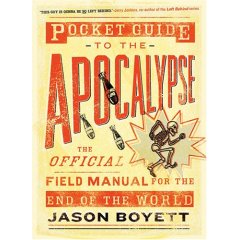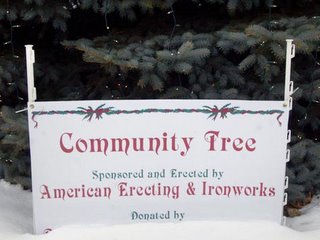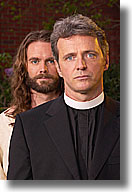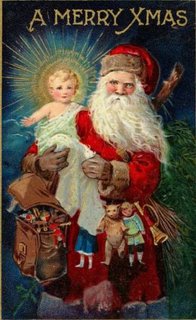
New Year’s Eve
December 31st, 2005
Isaiah 51:1-6 (Matthew 1:18-21)
“A Chip Off the Old Block”
I. Introduction –
As another year draws to a close, we naturally think of the events of the past 12 months, and reflect, and evaluate the year now closing. Has 2005 been a good year? In the news, there have been, as always are, major stories. Hurricanes, Supreme Court Nominations, and a new Pope. History books years from now may well recall the many events of 2005.
But what are the top stories in your life? A new job? A new relationship? A graduation or some other major turning point? Maybe this year was, well, just another year. Historical, or forgettable?
In any case it’s a good time to look back, and also to look forward. And so here, as we gather around God’s word, we do the same. Tonight I want to touch on both our reading from Isaiah and also part of Matthew’s Christmas account – both of which you just heard.
II. “Look to the rock from which you were cut”
We Americans, many have said, have little to no sense of history. Richard Lederer, a history teacher, must know this well. Over the years, he has recorded various mistakes his students have made in their lessons. He then pieced together some of these mistakes into a quite interesting history of the Bible:
In the first book of the Bible, Guinesses, Adam and Eve were created from an apple tree. One of their children, Cain, asked "Am I my brother's son?" God asked Abraham to sacrifice Issac on Mount Montezuma. Jacob, son of Issac, stole his brother's birthmark. Jacob was a partiarch who brought up his twelve sons to be partiarchs, but they did not take to it. One of Jacob's sons, Joseph, gave refuse to the Israelites.
Pharaoh forced the Hebrew slaves to make bread without straw. Moses led them to the Red Sea, where they made unleavened bread, which is bread made without any ingredients. Afterwards, Moses went up on Mount Cyanide to get the ten commandments. David was a Hebrew king skilled at playing the liar. Solomon, one of David's sons, had 500 wives and 500 porcupines.
But especially for Christians, it’s important to know our history. Just as it was for the ancient Israelites. Here in Isaiah, we read a prophecy about the Messiah. But first, he calls the people of Israel to remember their history, that is, where they came from. “Look to the rock from which you were cut… the quarry from which you were hewn”.
They followed in the line of Abraham’s descendants. Abraham was a man of great faith, but the Israelites weren’t always a “chip off the old block”. Their faith flagged and wavered. The did not always stand fast. Still the encouragement here is to remember Abraham and your fathers, and to be LIKE them. To trust God and his promises.
The application to us is clear. We, the spiritual children of Abraham, also need the reminder of the “rock from which [we] were cut”. Well, there’s Adam, from whom we inherit our sinful nature – like father, like son and daughter. Born of the dust, the clay, the rock of our sinful parents, we follow in their footsteps of sin. Genesis makes it clear: God made Adam in his image. But Adam brought forth sons in his own (now tainted) image.
Then there’s Abraham and all the other people of faith, from whom we inherit the promises of God. We are children of Abraham, by faith, Hebrews tells us. And the good news is that we are born of the Rock that it Christ, reborn in the waters of baptism, we are a new creation.
We are now, in Christ, “A Chip off the old block”. For he has made us his own. He became one of us to make us like him - holy and righteous. Hm… righteous. Like Joseph…
III. “Because Joseph was a righteous Man”
Joseph was a righteous man, Matthew says. Here he doesn’t mean Joseph was sinless, or righteous on his own account. But he was a faithful believer who trusted God as we do. Still, had Jesus been born with Joseph as his true earthly father, He would have inherited Joseph’s nature, as we do from our parents. And Joseph’s sinful nature was certainly NOT righteous. That’s why the miraculous, virgin birth of the Christ is so important. We have a savior who is both human (via his mother Mary) and Divine (via God his Father). He was born, “not by human effort, or of a husband’s will”, but by the power of the Holy Spirit.
No, Joseph couldn’t have been our Savior. Nor could any son of Joseph’s. Only the God-man, Jesus Christ could offer his own righteousness to make us righteous. Only he, the spotless Lamb of God could be offered on the altar of the cross for the sins of the world. In this sense, Jesus is certainly no “Chip off the old block”, when it comes to Joseph. But he is one with his true Father, the Heavenly Father. Just as God’s mighty arm saved the Israelites of the Old Testament, so does God’s mighty Son save the New Israel, his church.
IV. “Call him Jesus”
On this New Year’s Eve, it is the church’s tradition to focus on the Naming of Jesus. That his name, “Jesus”, means “God saves” or simply, “Savior”. He might have been known as “Jesus of Nazareth” or “Jesus, Son of Joseph”. But he is always the Savior, and ONLY he is the Savior.
Of course this Jesus is known by so many other names – Wonderful Counselor, Mighty God, Everlasting Father, Prince of Peace – he is called the Lamb of God and the Prophet of the Most High, He is David’s Son and David’s Lord. He is the Word made flesh, Emmanuel, God with us. And in all these names, we learn something more about him. Something more about his gracious character, and his mercy toward sinners. We see him revealed more and more as Savior. Our savior.
As we look back, already to Christmas not even a week away… and yet already so much has changed. As we look back over the last year, maybe it seemed long, or maybe it went by in a blur. As we look back into the ages, and see the faithfulness of God to his people – to Abraham, to Moses, to David, to Isaiah – And we look back to Bethlehem and to Calvary and to the empty tomb in the garden – we look back to see 11 men looking up into the sky and wondering where their Lord has gone and why. And the angels reminded them to also look forward… he will come again!
So here at the cusp of a new year, let us look forward to another year with Jesus as our Savior. Another year full of hearing his word, receiving his body and blood, and enjoying the countless gifts and blessings he brings to our lives. May we always “Look to the Rock from which [we] were cut”, remembering God’s gracious work done for us, and Look to the future with faith in the one named “Jesus”. “God Saves”. For he has saved, and will save us! In that precious, mighty, and holy name. Amen.
V. Conclusion Jesus, “a chip off the old block”. The Son of Man and Son of God who is born to be our Savior. Thank him for the blessings of the past, and promises of the future.










